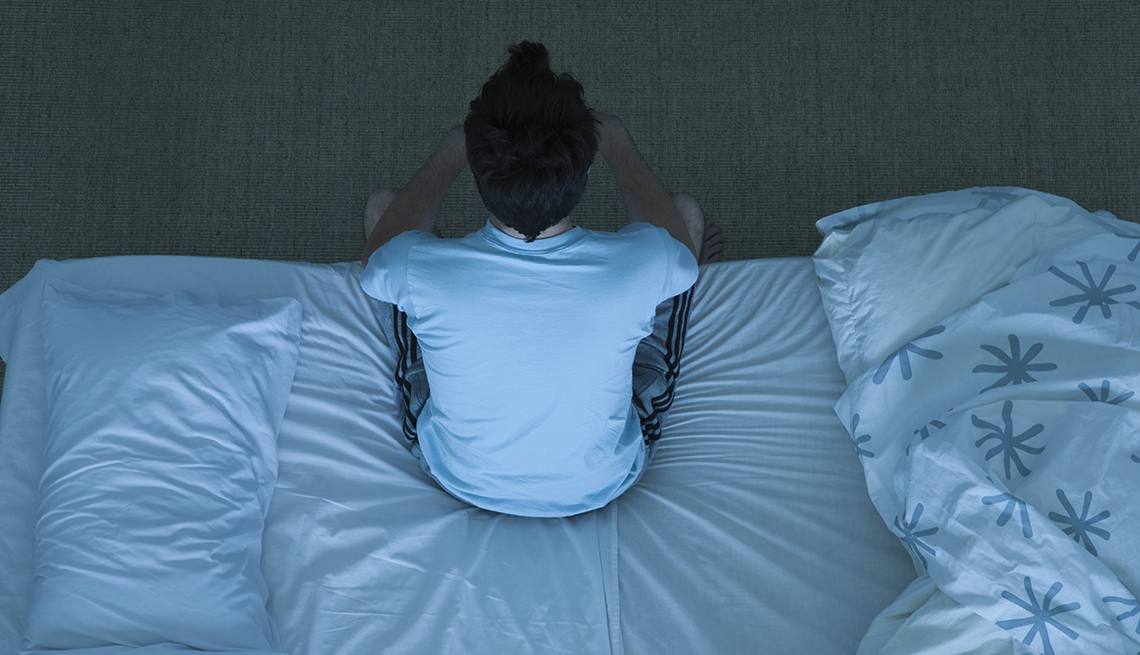
Why covid insomnia persists and how to get help
- Select a language for the TTS:
- UK English Female
- UK English Male
- US English Female
- US English Male
- Australian Female
- Australian Male
- Language selected: (auto detect) - EN
Play all audios:

UP AT 3 A.M.? HOW TO GET BACK TO SLEEP TURNS OUT THERE’S AN ART — AND SCIENCE — TO BANISHING THOSE EGREGIOUSLY EARLY WAKE-UPS Whether unwanted wake-ups are a new thing for you or more of a
longer-term bane, there are better ways to get back to sleep than, well, freaking out that you’ll never be able to (though we’ve all been there). Here’s what experts recommend to convince
your mind and your body to relax and surrender to slumber. 1. BANISH THE CLOCK The clock may be sitting beside you, but it is not your friend. If you wake in the night, resist the urge to
look at it. Instead, remind yourself that it is normal to wake during the night — we all do — and that you will fall back asleep. “One of the best things we can do is not worry or panic,
because waking is a normal part of sleep,” says Martin Reed, an insomnia coach in Oregon. Instead, make sure you are comfortable. If you need to go to the bathroom, do that. As Helene A.
Emsellem, M.D., the director of the Center for Sleep & Wake Disorders in Chevy Chase, Maryland, says, “Don’t argue with your bladder.” But on your way there, you want to avoid bright
lights. If you cannot get to the toilet and back without turning one on, keep a pair of blue-light-blocking glasses on your bedside table and wear those to the bathroom. When you get back
into bed, you want to feel comfortable, relaxed and free of intrusive thoughts. So, set up an environment that keeps those thoughts at bay. Try a headband or a pillow with an embedded
speaker that plays relaxing music or a podcast or a TED talk that is only mildly interesting. “What you want the sound to do is cocoon you in your bed, in the dark, in a sleep-conducive
environment,” Emsellem says. “Block out your environment and block out your inner thinking. If the thinking train is still going, you haven’t done enough to distract yourself.” 2. GET UP AND
RESET Give yourself about 20 minutes to drift back to sleep (guess the time, don’t track it on the clock.) If you are still awake, get up and give your body a reset. Move to a different
room in your home and find a relaxing activity to clear your mind. Read something that you find slightly boring but pleasurable, color in an adult coloring book, meditate or practice
breathing exercises. Listen to a podcast, perhaps one you’ve already heard before. Michael J. Breus, a clinical psychologist and the author of _The Power of When_, suggests flipping through
old photo albums to recall happier times. Return to bed when you feel sleepy or groggy, and not just tired. 3. RECOGNIZE CHANGES IN YOUR BODY Most bouts of insomnia are temporary and will
resolve without intervention. However, if yours persists for several weeks or longer, it could be a sign of a more serious health issue, like depression or sleep apnea, for which you may
need professional help. Also, your sleep needs change throughout your life. Your struggles to sleep may be a sign that you need less sleep than before and may actually be spending too many
hours in bed. “Everybody thinks that sleep is static, but it’s not,” says Dianne M. Augelli, M.D., a sleep medicine specialist who teaches at Columbia University. Just because you needed
eight hours at 20 does not mean you need as much at 60, she says, noting that our needs ebb and flow throughout life. 4. DON’T PANIC Your body wants to sleep, even if it doesn’t seem that
way at 3 a.m. But you can’t force it. “Sleep is a lot like love: The less you look for it, the more it shows up,” Breus says. “There is nobody on this earth who will not fall asleep
eventually. Nobody.” And consider this: An hour of rest while awake is about the equivalent of 20 minutes of sleep, he says, so the time spent trying to nod off is not entirely lost.
However, anyone who’s suffered through endless nights of insomnia knows how exhaustion makes it difficult to concentrate and increases your risk of an accident or injury. In the long run,
people who do not get enough sleep have an increased risk of developing other health problems, such as weight gain or high blood pressure. Breus suggests thinking differently about an early
morning awakening to help take the pressure off when you find yourself wide awake for hours. “Flip the script,” he says, and celebrate that you have, say, two more hours before you have to
start your day.
